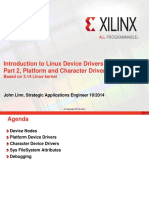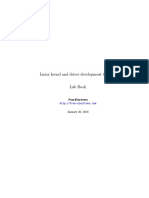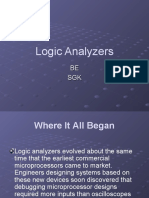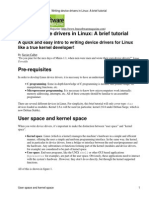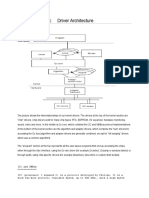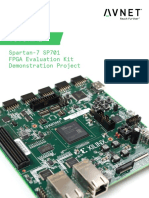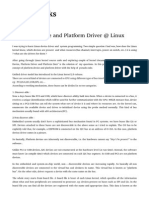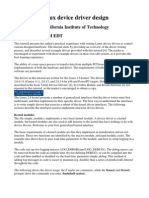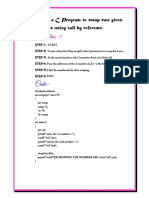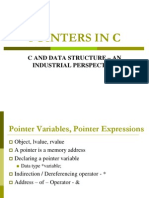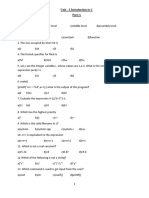Linux Platform Device Driver - CodeProject https://www.codeproject.com/Tips/1080177/Lin...
13,846,625 members Sign in
Search for articles, questions, tips
home articles quick answers discussions features community
help
Articles » General Reading » Hardware & System » Device Drivers
Linux Platform Device Driver
Nagaraj Krishnamurthy, 26 Feb 2016
4.27 (6 votes) Rate this:
This tip will go into the details of platform devices and their corresponding drivers in Linux
Download source (TAR) - 10 KB
Download source (ZIP) - 1.6 KB
Introduction
A platform device is one which is hardwired on the board and hence not hot-pluggable. The driver for this device need
not check for the presence of the device and can just go on and do what is required to enable the device to make it
operational. If the device is not found, the driver is simply ignored.
Background
Platform device driver works a bit differently than normal hot-pluggable device driver. Platform device is either directly
mounted on the board or part of the SoC and hence can't be physically removed. Compared to hot-pluggable devices,
platform device might require some extra settings like gpios pin muxing, power on & reset using gpio control, initializing
the clock source, etc., which are very specific to the board or SoC - hence the name platform device driver. This tip
gives a brief overview of how to write a platform device driver for Linux.
Using the Code
The source code for this article is given for reference. The platform device code is usually part of the BSP/CSP. The
1 of 5 02/02/19, 5:07 PM
�Linux Platform Device Driver - CodeProject https://www.codeproject.com/Tips/1080177/Lin...
device driver code is written as a separate module in the appropriate linux-kernel-src/driver/ directory (char for serial
device, net for networking device, etc). In the given example code, both the platform device and platform driver code
are presented in a single file for easy viewing of the code.
Platform Data
This structure is specific to the platform device. As indicated in the previous section, since platform device is usually
part of the BSP/CSP, this data structure apart from class specific device data, will contain platform specific data such
as gpios used, irq number (if interrupt is used), clock frequency settings required by the platform device etc. It usually
implements functions that can be called by the device driver for doing platform specific stuff. This way, the device driver
can be made independent of the platform and hence can be used across multiple platforms. For example, the below
example implements functions for power ON/OFF the device and for doing the device reset.
Hide Copy Code
/* Data structure for the platform data of "my device" */
struct my_device_platform_data {
int reset_gpio;
int power_on_gpio;
void (*power_on)(struct my_device_platform_data* ppdata);
void (*power_off)(struct my_device_platform_data* ppdata);
void (*reset)(struct my_device_platform_data* pdata);
};
/* "my device" platform data */
static struct my_device_platform_data my_device_pdata = {
.reset_gpio = 100,
.power_on_gpio = 101,
.power_on = my_device_power_on,
.power_off = my_device_power_off,
.reset = my_device_reset
};
Registering Platform Device
This is done by calling platform_device_register() function with the device instance as shown below.
The name of the device is very important as this string is used by the OS for calling the probe() function when
the corresponding driver is installed. Please note that this function must be called before registering Platform Driver.
Hide Copy Code
static struct platform_device my_device = {
.name = "my-platform-device",
.id = PLATFORM_DEVID_NONE,
.dev.platform_data = &my_device_pdata
};
platform_device_register(&my_device);
Platform Driver
The platform driver implements a probe function that is called by the OS when this driver is inserted. Since the driver is
supposed to be platform independent, it depends on the platform_data functions to set up the device and make
it operational.
2 of 5 02/02/19, 5:07 PM
�Linux Platform Device Driver - CodeProject https://www.codeproject.com/Tips/1080177/Lin...
Hide Copy Code
static struct platform_driver my_driver = {
.probe = my_driver_probe,
.remove = my_driver_remove,
.driver = {
.name = "my-platform-device",
.owner = THIS_MODULE,
.pm = &my_device_pm_ops,
},
};
Registering Platform Driver
Here is the function for registering driver with the OS. Please note that we are using
platform_driver_probe() instead of platform_driver_register(), since we know that this
device is present for sure in the system. The difference between these two functions is that with
platform_driver_register(), we are asking the OS to put this driver in the list of drivers it maintains for
doing device to driver matching when the devices come in/out of the system. Since platform devices are either always
present always absent in system (and not-hot-pluggable), we don't need to put our platform driver in the OS driver list.
With platform_driver_probe(), we are asking the OS to check if a platform device is present with the
matching name. If the device is present in the system, the corresponding probe() function is called. If not present,
the driver is simply ignored.
Hide Copy Code
ret = platform_driver_probe(&my_driver, my_driver_probe);
Platform Device and Driver binding
When the platform_driver_probe() function is called, the operating system scans through the list of
available platform devices and checks if the driver.name matches with the device name. If yes, it calls the driver
probe function with the platform data. The probe function can then initialize the clock settings, power-on, reset the
device, allocated the driver data and register the corresponding class specific driver with the OS.
Hide Shrink Copy Code
static int my_driver_probe(struct platform_device *pdev)
{
struct my_device_platform_data *my_device_pdata;
struct my_driver_data* driver_data;
printk(KERN_ALERT " %s\n", __FUNCTION__);
my_device_pdata = dev_get_platdata(&pdev->dev);
/* Power on the device. */
if (my_device_pdata->power_on) {
my_device_pdata->power_on(my_device_pdata);
}
/* wait for some time before we do the reset */
mdelay(5);
/* Reset the device. */
if (my_device_pdata->reset) {
my_device_pdata->reset(my_device_pdata);
3 of 5 02/02/19, 5:07 PM
�Linux Platform Device Driver - CodeProject https://www.codeproject.com/Tips/1080177/Lin...
/* Create the driver data here */
driver_data = kzalloc(sizeof(struct my_driver_data), GFP_KERNEL);
if(!driver_data)
return -ENOMEM;
/* Set this driver data in platform device structure */
platform_set_drvdata(pdev, driver_data);
/* Call the class specific register driver here */
// tty_register_driver(ttyprintk_driver); // for UART driver
// register_netdev(net_driver); // for Net driver
// sdio_register_driver(sdio_river)
return 0;
}
License
This article, along with any associated source code and files, is licensed under The GNU General Public License
(GPLv3)
Share
About the Author
Nagaraj Krishnamurthy
India
No Biography provided
You may also be interested in...
4 of 5 02/02/19, 5:07 PM
�Linux Platform Device Driver - CodeProject https://www.codeproject.com/Tips/1080177/Lin...
Simple I/O device driver Tetris on Canvas
for RaspberryPi
A Simple Driver for Linux Linux Ethernet Driver
OS using Qemu
DryWetMIDI: High-Level Creating a Linux Kernel
Processing of MIDI Files driver with Visual Studio
Comments and Discussions
You must Sign In to use this message board.
Search Comments
Spacing Relaxed Layout Open All Per page 25 Update
First Prev Next
What about rmmod/insmod Member 13083417 25-Mar-17 0:34
Hello,
I'm wondering what happens when rmmod'ing / insmod'ing platform device drivers's modules, and how does
that interract with the probe() & remove() functions. Could you elaborate a bit on that subject in your article ?
Thanks
Sign In · View Thread
Last Visit: 2-Feb-19 1:35 Last Update: 2-Feb-19 1:35 Refresh 1
General News Suggestion Question Bug Answer Joke Praise Rant
Admin
Permalink | Advertise | Privacy | Cookies | Terms of Use | Mobile
Select Language ▼
Web05 | 2.8.190129.1 | Last Updated 27 Feb 2016
Layout: Article Copyright 2016 by Nagaraj Krishnamurthy
fixed | fluid Everything else Copyright © CodeProject, 1999-2019
5 of 5 02/02/19, 5:07 PM

